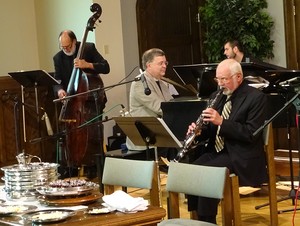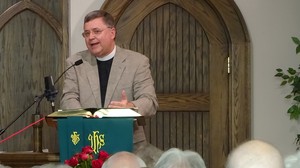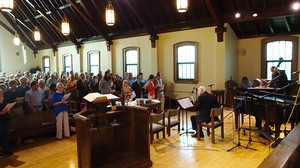If the Jazz Communion celebrated at First Presbyterian Church of Clarks Summit, Pa., on Sunday, Sept. 6, was a riff on traditional worship, then the whole of the Rev. Bill Carter’s 30 years as a Presbyterian Church (U.S.A.) teaching elder has been a riff on a conventional call to ministry.
And all that jazz.
In this small Pennsylvania borough over the Labor Day holiday weekend, widely acknowledged as the last opportunity for a summer getaway, at least 250 people chose instead to stay in town—or come to town—to cram into First Church’s sanctuary.
The Sept. 6 attendance numbered about 100 more than on a typical summer Sunday.
“They were sitting on folding chairs hastily arranged by the ushers,” Carter said. “Attendance resembled the ‘big service’ on Easter.”
Worshipers started arriving at least an hour early for the church’s 24th annual Jazz Communion featuring Vince Guaraldi’s “Jazz Mass.” The 10:00 a.m. service was preceded by a talk by Derrick Bang, Guaraldi’s biographer and a nationally-known writer from Davis, Calif.
The sanctuary was already full when Bang began his historical overview of Guaraldi's music and mass, which debuted 50 years ago.
According to Bang, Vince Guaraldi, a San Francisco-based pianist, made history on May 21, 1965, by composing and performing, with his trio—bassist Tom Beeson, and drummer Lee Charlton—the very first “Jazz Mass” presented during a U.S. worship service. The event took place at San Francisco’s newly completed Grace Cathedral as part of its inaugural “Year of Grace” celebration.
Bang told worshipers that the event’s historical significance cannot be overstated.
“Until that moment, jazz—still regarded as the Devil’s music by religious conservatives—had never been heard during an American church service,” he said. “At the time, Guaraldi was enjoying the fame resulting from his Grammy Award-winning instrumental hit, ‘Cast Your Fate to the Wind.’ Today he is best remembered as the composer who added a bossa nova beat to Charlie Brown and his friends, thanks to the collaboration with director Lee Mendelson and animator Bill Melendez, which began with A Charlie Brown Christmas.”
All of this was literally music to Carter’s ears—the veteran Presbyterian minister also happens to be an acclaimed jazz pianist.
Over many long years—starting with his youth group at the First Presbyterian Union Church of Owego, N.Y., where he played the “saloon music” in a dramatic production about the Prodigal Son—Carter has worked hard to find the links between the life of faith and the music of jazz.
“When I answered God’s call to go to Princeton Seminary in 1982, I had just graduated from college and was working four nights a week as a jazz pianist,” Carter said. “I thought I was essentially leaving that all behind to go off to more ‘noble work.’ It was a narrow view of being a pastor in a church, which I still am 30 years later.”
After Carter entered Princeton, he was recruited by president Tom Gillespie to play for a faculty Christmas party at Gillespie’s home. He was also invited to play the soundtrack, a jazz score, for a student production of “A Thurber Carnival.”

The Presbybop Quartet leads the music at First Presbyterian Church, Clarks Summit, Pa. The Rev. Bill Carter, piano; Al Hamme, sax and flute; Tony Marino, bass, Tyler Dempsey, drums. —Jeff Kellam
“I thought the jazz music was completely secular and church was something else,” he said.
And while Princeton began to help him to think differently about bridging the two, it was a student position he held at the United Presbyterian Church in Plainfield, N.J., that proved transformational.
“The pastor and the music director would do a different service from a different model of music every month,” Carter recalled. “When they said they wanted a jazz service sometime in the spring, they asked me if I could do it. I said I’d need to hire a bass player and a drummer. They said no problem. I had no idea of what the repertoire would be. We did ‘They’ll Know We Are Christians by Our Love.’ It was kind of a quasi-bluesy folk rock. It didn’t really swing very hard.”
But it got better.
Another of Carter’s key influences in those early years was Dick Armstrong, a retired professor of ministry and evangelism at Princeton, who “is still out there.” Armstrong was well known for teaching a class at Princeton called Evangelism and Music.
Even though Carter didn’t take Armstrong’s class, he began thinking that he was going to be stuck in the mode of thinking that he was just going to be a pastor and that’s it.
“I could not see that it could all be interconnected, which is of course where it has all come around for me,” he said. “Right now I have one calling that’s pretty extensive and wide. I’m pastor-pianist-dad-spouse-citizen. It was the only way I could conceive of it. I still run into clergy all the time who ask, ‘How do you do this? You must shortchange your church doing all of these projects.’ I tell them that it’s all of a piece and that I try very hard to keep it all in balance. Some people garden, my wife is a knitter, I make jazz. That’s what I do.”
Carter’s friend, Eugene Lowry, was also a profound influence. The retired preaching professor is also a gifted jazz pianist. “He’s kind of a Kansas City blues player,” said Carter. “We’ve talked over the years about some of the connections. In his retirement, he has done a lot of presentations on how jazz connects with preaching. With preaching, the preacher reads 3 or 4 verse from the Bible and she goes on for 18 minutes. The same kind of exegetical and proclamatory process is what a jazz player does. A player learns the tune and then develops the courage and the risk to spin variations upon it.”
Yet despite his many mentors and experiences of connecting jazz with worship, for Carter, his musical gifts were still a secondary piece, even in his first ordained call.

Bill Carter. —Jeff Kellam
“Even when I came to Clarks Summit, it was still a secondary thing,” he said. “When I did my trial sermon there, they voted, they said ‘yes,’ and then a guy stood up in the back pew—on top of the pew—and said, ‘We’ve heard you preach; now would play something?’ I said that’s not why I’m here. I’m here to be your pastor. It took me a while to bring the pieces together.”
First Church already had a strong music program when Carter was called there in 1990. “I didn’t want to disrupt that, but as time has gone on, I’ve come alongside of that,” he said.
Carter is also a composer, the founder of Presbybop Music, and a member of the Presbybop Quartet, which he formed in 1993 with Al Hamme, his college music professor from Binghamton University.
“I’ve seen the church’s hunger for jazz all over,” he said. “It’s often unnamed and undiagnosed. My quartet has traveled all over the country for 15 years. I’m probably the only PC(USA) minister who spends a week of vacation on the road with a jazz quartet.”
Because Carter wants what he does to be a model for other people, the Presbybop Quartet has produced a DVD called ‘Jazz Belongs in Church’ that shows a church what a jazz service could look like. As for the service on Sept. 6, Carter said that the worshipers were ecstatic, declaring the 24th annual service to be "the best one yet.” His own assessment of the event was “somewhere between ‘all in a day's work’ and ‘this is what God put me on the planet to do.’"
“Churches could do more to create an energizing festival like this,” he said, lamenting how rare such services are, and unnecessarily so.
Carter’s views about “infusing the life of faith with the swinging pulse of jazz” are perhaps best summarized in a statement he made near the end of his Sept. 6 sermon.
"What I have learned about jazz in the church is that people really want it,” he preached. “Even if they sit scowling with their arms crossed, they really want it. They want to be in the presence of the energy and imagination. They want the passion to kiss them alive. They want their own frozen hearts to defrost. And it’s not the jazz per se; it is what’s behind the jazz. They want to know there is a deep joy at the center of the universe that has the power to make all things well."

